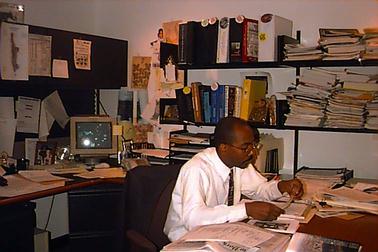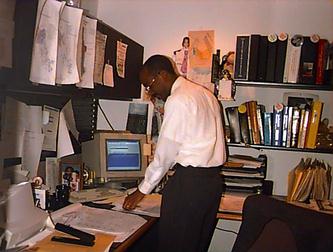|
|| Home Page | Welcome | Contents | Staff | Support Us || |
|
|
|
|
|
Rayshawn Brewington, a 17 year old, was the man of the house in his small Harlem apartment living with his mother and two younger brothers. An ex-spouse was threatening his family, so Rayshawn decided to go out and borrow a gun to protect his mom.
This was a soft kid, no record, no violence. It tore up the family. He was very close to his young brother. He thought about suicide. He was charged with manslaughter. Neighborhood Defense Service (NDS) was able to bring members of the community to his arraignment, get a lower bail and were able to prepare him for the grand jury, which ultimately dropped the charges. "We were able to use our resources and trust in the community for this kid," said Leonard Noisette, director of NDS. "The reality of his situation, prompted him to do this. This was just a tragic accident. He's in counseling. He's going to have to deal with this the rest of his life." The Neighborhood Defenders Service is a program to represent people in Harlem in any situation. It started in December of 1990 by an organization called the Vera Institute. The Vera Institute created a number of community agencies. The real goal for NDS was to find a better way to provide public defender services.
The Neighborhood Defender Service has a staff of 33 people, which include 15 lawyers, 3 investigators, 4 social workers, and others. The NDS goes into schools and instructs kids on how to respond when they are confronted by the police and to prevent them from getting hurt, or reduce their chances of spending 24 to 36 hours in the system. They teach kids how to keep their cool.
He related the time when he was a child. He and his friends were walking and cops pulled up in their car and got out. They asked one of his friends to take his hands out of his pockets. His friend refused and the cops quickly pulled out their guns and pointed them at his friend. "There's a point in which your attitude and your being angry and wanting to stand up to them becomes counterproductive," said Mr. Noisette. He said it was important to make mental notes when it seems like you are being harassed. Notice their badge numbers, but do so without being obvious. Notice the license number on the police car. Remember the date and time so if you want to file a complaint later, you have that information. Notice other people out on the street, whether it be store owners or friends. "When these things go down, a lot of times people come out and watch." "You can always tell when the police have stepped over the line," explained Mr. Noisette. "If a person is arrested for disorderly conduct, resisting arrested, or obstructing justice ... it means they gave the police a hard time. The way they pay you back is arresting you and putting you in the system, God forbid hurting you or killing you." There are places you can complain, One can complain to the Civilian Complaint Review Board, the precinct. Some say they're not effective, but there are places to complain. Mr. Noisette feels stopping police harassment is a long process, perhaps requiring cops to live in the neighborhoods they police so they would know and understand the community better. He said the way to really affect change is to become active and register to vote. "The disappointing thing about kids that I talked to is that they don't have the desire to vote," said Mr. Noisette. He only knows of two ways to change government. One is to affect change within the system or agitate from without. He said it will probably take a combination of both.
"That's what I think gets me going." Mr. Noisette grew up in South Jamaica, NYC. He was educated in NY City pubic schools. He went to Stuyvesant HS and to NYU Law school. He didn't know what he wanted to get involved with, but knew it would be something to help people who couldn't afford legal assistance. He worked for the public defender's office, but was somewhat dissatisfied with the amount of cases. His job with NDS is to raise money, and be the public face to the organization. NDS is funded mostly by government money, 80% City, and almost 20% State funding. Lawyers come from a broad range of schools. 15 lawyers from NYU, Georgetown, Rutgers, Harvard, Brooklyn.. Sixty percents of the lawyers are of color, as opposed to about 5% in most law firms.
The NDS accepts volunteers to assist in community outreach, letting community know about the program. With volunteers, they determine where their interests and skills are so we can see where to place them. These are instructions NDS asks folks to tell cops.
To receive help from NDS, people have to be: 1/ indigent (not able to hire a lawyer); 2/ live in N. Manhattan; 3/ case must be prosecuted in Manhattan. If they receive benefits, they are generally able to get NDS services. This service is ONLY available in Harlem. As Mr. Noisette said, "Some may say 'Why Harlem?' Well, Harlem is special"
for further reading: Guide to Dealing with Police Harassment
|
|
|| Home Page | Welcome | Contents | Staff || Back to the top
|


 "The
best way to handle confrontations with the police is to be as cooperative
as possible." Legally, Mr. Noisette said, one does not have to give
identification but if one does not choose to do so, the police may
think you are giving them attitude. To the cops it's a power and authority
thing. "If they ask for your name, tell them your name."
"The
best way to handle confrontations with the police is to be as cooperative
as possible." Legally, Mr. Noisette said, one does not have to give
identification but if one does not choose to do so, the police may
think you are giving them attitude. To the cops it's a power and authority
thing. "If they ask for your name, tell them your name."